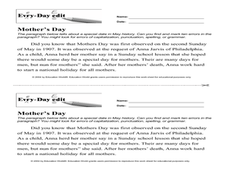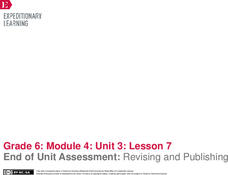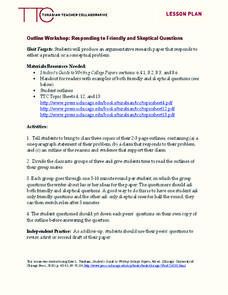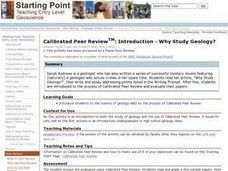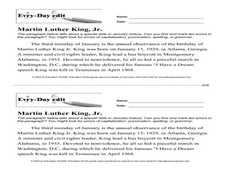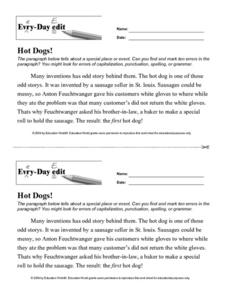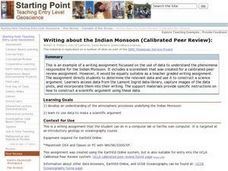Education World
Every-Day Edit: President James Buchanan
For this everyday editing worksheet, students correct grammatical mistakes in a short paragraph about President James Buchanan. The errors range from punctuation, capitalization, spelling, and grammar.
Education World
Every-Day Edit: Anne Frank
In this everyday editing worksheet, students correct grammatical errors in a short paragraph about Anne Frank. The errors range from capitalization, punctuation, grammar, and spelling.
Education World
Every-Day Edit: Harry Potter
In this everyday editing worksheet, students correct grammatical errors in a short paragraph about Harry Potter. The errors range from capitalization, punctuation, spelling, and grammar.
Education World
Every-Day Edit: The Seeing Eye
For this everyday editing worksheet, learners correct grammatical mistakes in a short paragraph about the first American training school for dogs and their blind owners. The errors range from punctuation, capitalization, spelling, and...
Education World
Every-Day Edit: America's Composer
For this everyday editing worksheet, students correct grammatical mistakes in a short paragraph about Aaron Copland. The errors range from punctuation, capitalization, spelling, and grammar.
Education World
Every-Day Edit: Mother's Day
In this everyday editing learning exercise, students correct grammatical mistakes in a short paragraph about Mother's Day. The errors range from punctuation, capitalization, spelling, and grammar.
EngageNY
End of Unit Assessment: Revising and Publishing
Dictionaries, thesauruses, word walls, oh my! Pupils use several resources to revise their position papers to include appropriate vocabulary. Then, after peer editing, scholars write the final drafts of their essays and self-assess using...
Curated OER
Editing a Newspaper Article
Students investigate article editing in today's society by writing their own news articles. In this journalism lesson, students create a word web based on the word "editing." Students write their own news articles and peer edit them in...
Curated OER
Once Upon a Time: Writing Stories about Reading
Students read a New York Times article to examine strong first person voice in essays about reading. They write their own first person essays about some aspect of reading, participate in peer review, and re-writing.
Curated OER
Writing Process
Introduce primary graders to the writing process. After reviewing the steps, they practice using the process by writing a book report. Before writing the draft, they complete a graphic organizer. The completed draft is reviewed by peers....
Curated OER
Collaborative Editing
With the use of an online editing site, budding authors revise their writing. This is a creative way to have your class practice essay revision. Instead of being a tedious process, editing and revising can be fun.
Turabian Teacher Collaborative
Outline Workshop: Responding to Friendly and Skeptical Questions
Answering questions is the best way to hone and revise your argument. Foster receptive writers with a workshop activity that promotes peer editing and argumentative writing skills. Given lists of both friendly and skeptical questions,...
EngageNY
Presenting a Research-Based Claim: Visual Aid and Peer Critique
Back to the drawing board. Scholars work on the visual to complement their claim presentations using the Criteria for the Cascading Consequences Chart Visual as a guide. They then practice their presentations with partners.
EngageNY
Writing the Children’s Book: Day One
With a brief mini-lesson, scholars learn about using strong verbs, sensory details, and precise descriptions. Next, pupils continue working on their children's book storyboards before choosing their strongest pages for peer critiques.
Curated OER
Calibrated Peer Review: Introduction-Why Study Geology?
Pupils read an article written by Sarah Andrews, a geologist who has written mystery novels featuring a geologist who solves crimes. After reading the article, students write an essay based on a Writing Prompt and begin peer review once...
Curated OER
Peer Editing
Sudents read and critique three of their fellow classmates' science fiction short stories on three consecutive days for mechanics, short story elements, style, and informational elements.
Education World
Every Day Edit - Martin Luther King, Jr.
In this everyday editing activity, students correct grammatical mistakes in a short paragraph about Martin Luther King, Jr. The errors range from capitalization, punctuation, spelling, and grammar.
Education World
Every-Day Edit: Earth's Tilt
In this everyday editing worksheet, students correct grammatical mistakes in a short paragraph about the earth's tilt. The errors range from capitalization, punctuation, grammar, and spelling.
Education World
Every-Day Edit: Hot Dogs!
In this editing learning exercise, students read a short paragraph on "Hot Dogs!" and find the 10 errors in the paragraph dealing with capitalization, punctuation, spelling and/or grammar. Students correct each error.
Education World
Every-Day Edit: Longest Road on Earth
In this editing instructional activity, students read a short paragraph on "Longest Road on Earth" and find the ten errors involving capitalization, punctuation, spelling and/or grammar. Students correct each error.
Education World
Every-Day Edit: Alabama Statehood
In this everyday editing activity, students grammatical mistakes in a short paragraph about Alabama's statehood. The errors range from punctuation, capitalization, spelling, and grammar.
Education World
Every-Day Edit: Stock Market Crash 1929
In this everyday editing learning exercise, students correct grammatical mistakes in a short paragraph about the stock market crash of 1929. The errors range in capitalization, punctuation, spelling, and grammar.
Curated OER
Writing About the Indian Monsoon (Calibrated Peer Review):
Students develop an understanding of the atmospheric processes underlying the Indian Monsoon. They explore the use data to make a scientific argument. They listen to lecture on atmospheric circulation processes.
NASA
Revising an Investigation
Write, edit, and then revise! The fourth lesson in a five-part series asks peers to provide feedback on research. Individuals then use the research to edit and revise conclusions and develop their presentations.






